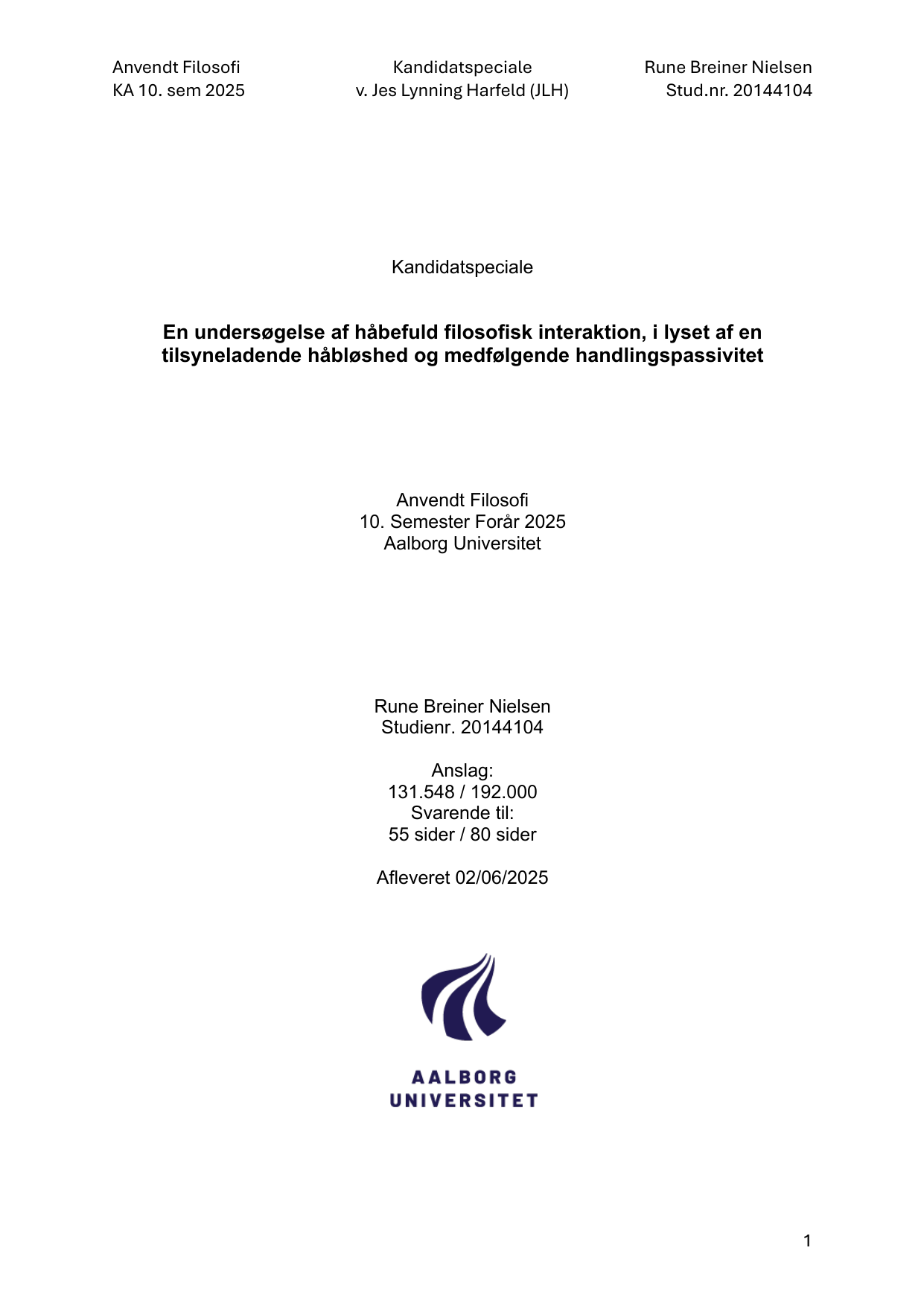
En undersøgelse af håbefuld filosofisk interaktion, i lyset af en tilsyneladende håbløshed og medfølgende handlingspassivitet
Oversat titel
An examination of hopeful philosophical interaction in the light of an apparent hopelessness including inaction
Forfatter
Semester
4. semester
Uddannelse
Udgivelsesår
2025
Afleveret
2025-06-02
Antal sider
55
Abstract
It seems today, that we live in a time of hopelessness and despair. That is the narrative of many recent books and articles regarding the climate crisis, politics, and hope itself. A lost hope about the future can lead to inaction, some argues. Several philosophers, psychologists and historians, including but not limited to Aristotle, Kant, Stevenson, Russell, Frodeman, and Bregman argue, that philosophy and an active participation in society can be a guide out of the hopelessness, this thesis points out. The purpose of the thesis is to examine hopeful philosophical interaction in the light of this seeming hopelessness. In the first part of the thesis, I give a brief summary of the history of applied philosophy. Beginning with the relation between theory and practice, first through Aristotle, followed by Immanuel Kant, and continuing with the explicit world of applied philosophy. In 1970 Leslie Stevenson argues, that applied philosophy can simply be rational discussions about specific moral issues, and that it needs to be regarding important questions of everyday life. In 1991 Almond and Hill argues, that applied philosophy can be philosophical engagement in problems regarding ethical consideration. In Lippert-Rasmussen introduce seven conceptions of applied philosophy, to show that applied philosophy is much more than applied ethics. In 2023 Gimmler et al. is raising the question about, whether applied philosophy should be concerned with the solution of problems or simply be concerned with the clarification of these. In the second part, I take a dive into field philosophy, which can be seen as the solution to the passivity of applied philosophy, according to Frodeman in 2015. One definition of the field of field philosophy, suggested by Frodeman, Briggle et al., is the set of inter- and transdisciplinary practices where “real-world” problems occur, and field philosophy is the philosophical practice of intervening and addressing these problems. Strong values in field philosophy is applicability, accessibility, participation, and being experimental and constructive, and several philosophers, including Gosvig-Olesen and Briggle, aim to make philosophy more than just an academic matter. Van Dooren later argues, that getting out into the field as a philosopher, is also about the learning of a kind of humility, about the impossibility of an understanding that is not situated. In the third part, I’m describing hope, what it is and what it is not. Hope can basically be described as something seemingly possible in the near future, Nygaard argues. Lundsgaard-Leth and Sköld makes the claim, that hope is very difficult to describe, even though it seems, that we all know, what it is. Hope is both passive and active and can lead the way for us to choose how to behave and act in the world. Bregman, as well as Kant earlier in the thesis, argues, that it does not matter how many doubts the history of humankind may be raised against hope. There is still hope, and we play an active part of giving ourselves and our peers hope and the feeling of agency and a locus of control. In the fourth and final part of the thesis, I am reflection on, whether applied philosophy and field philosophy can actually be the way out of the seeming hopelessness. It seems to me, that applied philosophy is a passive way of being in the world, and field philosophy is an active way of being. What we need, Gjerris argues, is a new interactive relationship between practice and hope – we need a practice leading to hope, and a hope leading to practice. In conclusion, this thesis’ examination of philosophy and hope leads to argue, that field philosophy indeed can be a way out of the hopelessness and despair. Field philosophy in this regard implies being active and reflective about the world and the problems herein. Field philosophy is making its way out of the apparent inevitabilities of the current reality, all the while allowing us to maintain grounded in this reality, I argue with reference to Nygaards definition of hope.
Emneord
field philosophy ; applied philosophy ; hope ; hopelessness ; action ; values ; agency
